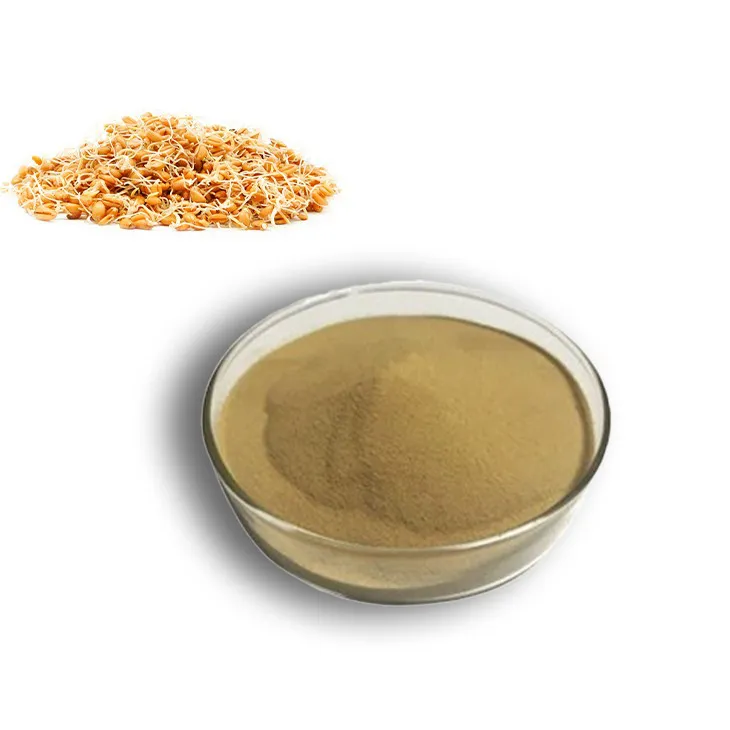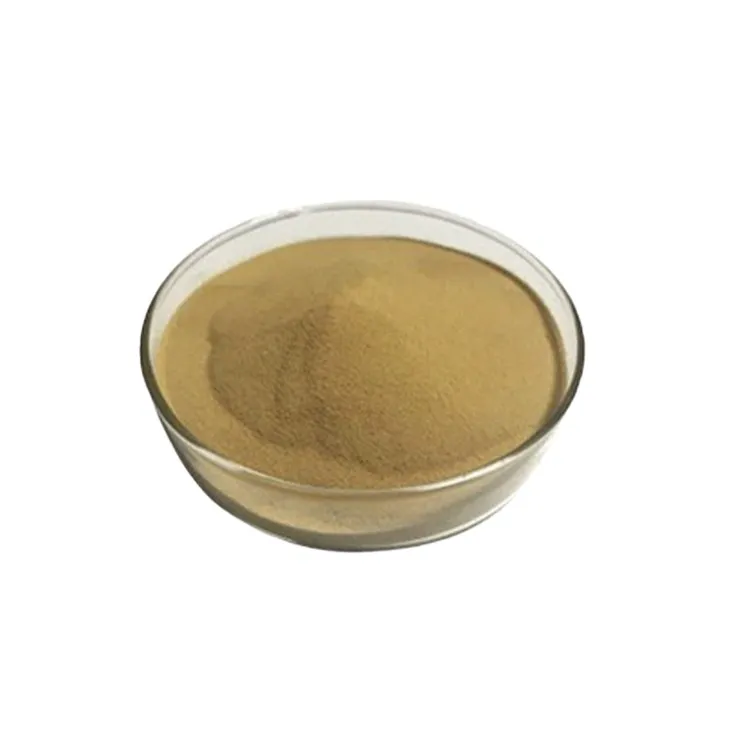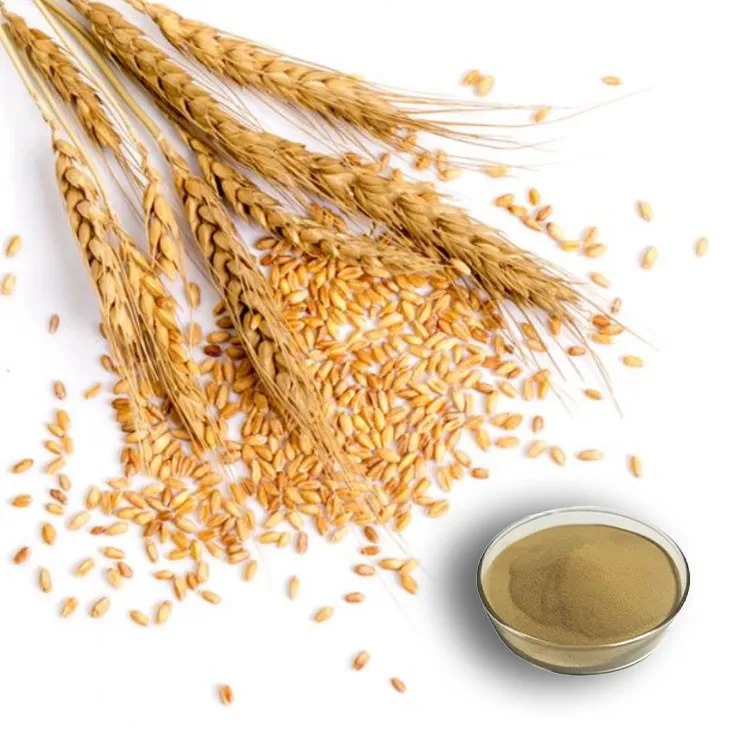- 0086-571-85302990
- sales@greenskybio.com
Use wheat germ extract to prevent diseases and enhance immunity.
2024-11-12

1. Introduction
In modern times, people are increasingly interested in natural methods to prevent diseases and boost their immunity. Among various natural substances, Wheat Germ Extract has attracted significant attention. It is a rich source of numerous nutrients that play crucial roles in maintaining the body's health and defending against diseases.

2. Nutrient Profile of Wheat Germ Extract
2.1 Essential Fatty Acids
Wheat Germ Extract contains essential fatty acids, such as omega - 3 and omega - 6 fatty acids. These fatty acids are vital for the proper functioning of the body. Omega - 3 fatty acids, in particular, are known for their anti - inflammatory properties. They can help reduce chronic inflammation in the body, which is often associated with various diseases, including heart disease, diabetes, and certain types of cancer. Omega - 6 fatty acids also contribute to the maintenance of healthy cell membranes and play a role in the body's immune response.
2.2 Amino Acids
The amino acids present in wheat germ extract are another important component. Amino acids are the building blocks of proteins, and different amino acids have different functions. For example, lysine is essential for the growth and repair of tissues. It also plays a role in the production of antibodies, which are crucial for the immune system to fight off infections. Other amino acids like arginine are involved in the regulation of the immune response. Arginine can enhance the function of immune cells, such as macrophages and T - cells, which are responsible for detecting and eliminating foreign invaders in the body.
2.3 Vitamins and Minerals
Wheat germ extract is also rich in vitamins and minerals. It contains vitamin E, which is a powerful antioxidant. Vitamin E can protect cells from damage caused by free radicals. Free radicals are unstable molecules that can damage cells and DNA, leading to various diseases and premature aging. The presence of minerals like zinc in wheat germ extract is also significant. Zinc is essential for the proper functioning of the immune system. It is involved in the development and activation of immune cells and helps in the production of cytokines, which are signaling molecules that regulate the immune response.

3. Interaction with the Body's Immune Cells
3.1 Macrophages
Macrophages are the first line of defense in the immune system. They are responsible for engulfing and digesting foreign particles, such as bacteria and viruses. The components in wheat germ extract can enhance the activity of macrophages. For example, the essential fatty acids can modulate the membrane fluidity of macrophages, allowing them to better recognize and engulf pathogens. Amino acids like arginine can also stimulate the production of nitric oxide in macrophages, which has antimicrobial and anti - tumor properties.
3.2 T - cells
T - cells play a crucial role in the adaptive immune response. They can recognize specific antigens presented by infected cells or foreign substances. Wheat germ extract can influence the development and function of T - cells. The nutrients in it can provide the necessary energy and building blocks for T - cell activation and proliferation. For instance, amino acids are required for the synthesis of T - cell receptors, which are essential for T - cells to recognize antigens. Vitamins and minerals also contribute to the proper functioning of T - cells. Zinc deficiency, for example, can lead to impaired T - cell function.
3.3 B - cells
B - cells are responsible for producing antibodies. The components of wheat germ extract can support the development and activation of B - cells. The amino acids in it can be used for the synthesis of immunoglobulins, which are the antibodies produced by B - cells. Vitamin E can protect B - cells from oxidative stress, ensuring their proper function. Additionally, the essential fatty acids can influence the cytokine environment, which in turn affects the activation and antibody production of B - cells.

4. Influence on Physiological Processes to Ward off Diseases
4.1 Anti - Inflammatory Effects
As mentioned earlier, the presence of omega - 3 fatty acids in wheat germ extract gives it anti - inflammatory properties. Chronic inflammation is a major contributor to many diseases, including autoimmune diseases, cardiovascular diseases, and neurodegenerative diseases. By reducing inflammation, wheat germ extract can help prevent the onset and progression of these diseases. It can also alleviate symptoms in patients with existing inflammatory conditions. For example, in patients with rheumatoid arthritis, the anti - inflammatory effects of wheat germ extract may help reduce joint pain and swelling.
4.2 Antioxidant Defense
The antioxidant vitamin E in wheat germ extract is a key player in protecting the body from oxidative damage. Oxidative stress occurs when there is an imbalance between the production of free radicals and the body's antioxidant defense mechanisms. This can lead to cell damage, DNA mutations, and ultimately, diseases. By scavenging free radicals, vitamin E helps maintain the integrity of cells and reduces the risk of diseases such as cancer and cardiovascular diseases. Moreover, other components in wheat germ extract may also contribute to the antioxidant defense system, either directly or by enhancing the function of antioxidant enzymes.
4.3 Modulation of the Immune Response
Wheat germ extract can modulate the immune response in a balanced way. It can enhance the immune system's ability to fight off infections without causing excessive inflammation or autoimmune reactions. For example, it can regulate the production of cytokines, ensuring that the immune response is appropriate for the type and severity of the infection. This balanced modulation is important because an overactive immune response can lead to tissue damage, while a weak immune response can result in the inability to clear infections effectively.

5. Practical Suggestions for Consuming Wheat Germ Extract
5.1 Incorporating into Diet
One of the easiest ways to consume wheat germ extract is to incorporate it into the diet. Wheat germ can be added to various foods, such as cereals, smoothies, and baked goods. For example, adding a tablespoon of wheat germ to your morning oatmeal can provide a significant amount of nutrients. It can also be sprinkled on top of yogurt or mixed into a fruit salad. When using wheat germ in cooking or baking, it is important to note that high - temperature processing may reduce the nutrient content to some extent. Therefore, it is advisable to add it towards the end of the cooking process or use it in raw preparations whenever possible.
5.2 Supplements
If it is difficult to obtain enough wheat germ extract from the diet alone, supplements can be an option. There are various forms of wheat germ extract supplements available in the market, including capsules, tablets, and liquid extracts. However, when choosing a supplement, it is important to select a reliable brand. Look for products that are tested for purity and potency. It is also advisable to consult a healthcare professional before starting any new supplement, especially if you have underlying health conditions or are taking other medications. Supplements should be taken according to the recommended dosage to avoid potential side effects.
6. Conclusion
In conclusion, wheat germ extract is a natural substance with great potential in preventing diseases and enhancing immunity. Its rich nutrient profile, including essential fatty acids, amino acids, vitamins, and minerals, enables it to interact with the body's immune cells and influence physiological processes to ward off diseases. By incorporating wheat germ extract into the diet or taking appropriate supplements, individuals can potentially improve their well - being and reduce the risk of various diseases. However, further research is still needed to fully understand all the mechanisms and benefits of wheat germ extract, and to ensure its safe and effective use in different populations.
FAQ:
What are the main nutrients in wheat germ extract?
Wheat germ extract is rich in essential fatty acids, amino acids, vitamins (such as vitamin E), and minerals. These nutrients play important roles in maintaining the normal function of the body. For example, vitamin E is a powerful antioxidant that can protect cells from damage, and amino acids are the building blocks of proteins which are essential for various physiological processes.
How does wheat germ extract interact with immune cells?
The components in wheat germ extract, such as certain amino acids and bioactive compounds, can stimulate the activity of immune cells like macrophages and lymphocytes. Macrophages are responsible for engulfing and destroying foreign invaders, and lymphocytes play a crucial role in the adaptive immune response. The nutrients in the extract can enhance the communication between these immune cells and help them function more effectively.
Can wheat germ extract really prevent diseases?
While wheat germ extract cannot guarantee the prevention of all diseases, its rich nutrient content can contribute to overall health and potentially reduce the risk of some diseases. For instance, its antioxidant properties can help prevent oxidative stress - related diseases. Also, by strengthening the immune system, it can make the body more resistant to infections, which is an important aspect of disease prevention.
What are the practical ways to consume wheat germ extract?
One can consume wheat germ extract in the form of supplements, which are available in capsules or tablets. It can also be added to food. For example, it can be mixed into smoothies, yogurt, or oatmeal. However, it is important to follow the recommended dosage instructions when using supplements to ensure safety and effectiveness.
Are there any side effects of consuming wheat germ extract?
In general, when consumed in moderation, wheat germ extract is safe for most people. However, some individuals may be allergic to wheat or its components. In such cases, consuming wheat germ extract can cause allergic reactions such as skin rashes, itching, or digestive problems. Also, excessive consumption of supplements may lead to an overdose of certain nutrients, which could have potential negative impacts.
Related literature
- The Nutritional and Therapeutic Potential of Wheat Germ Extract"
- "Wheat Germ Extract: A Natural Booster for Immunity and Health"
- "Beneficial Effects of Wheat Germ - Derived Compounds on Disease Prevention"
- ▶ Hesperidin
- ▶ Citrus Bioflavonoids
- ▶ Plant Extract
- ▶ lycopene
- ▶ Diosmin
- ▶ Grape seed extract
- ▶ Sea buckthorn Juice Powder
- ▶ Fruit Juice Powder
- ▶ Hops Extract
- ▶ Artichoke Extract
- ▶ Mushroom extract
- ▶ Astaxanthin
- ▶ Green Tea Extract
- ▶ Curcumin
- ▶ Horse Chestnut Extract
- ▶ Other Product
- ▶ Boswellia Serrata Extract
- ▶ Resveratrol
- ▶ Marigold Extract
- ▶ Grape Leaf Extract
- ▶ New Product
- ▶ Aminolevulinic acid
- ▶ Cranberry Extract
- ▶ Red Yeast Rice
- ▶ Red Wine Extract
-
Troxerutin
2024-11-12
-
Ginger Extract
2024-11-12
-
Kupilu Extract
2024-11-12
-
Grapefruit Seed Extract Powder
2024-11-12
-
Epimedium extract powder
2024-11-12
-
Bilberry Extract
2024-11-12
-
Okra Extract
2024-11-12
-
Scutellaria Extract
2024-11-12
-
Resveratrol extract
2024-11-12
-
Diosmin
2024-11-12





















